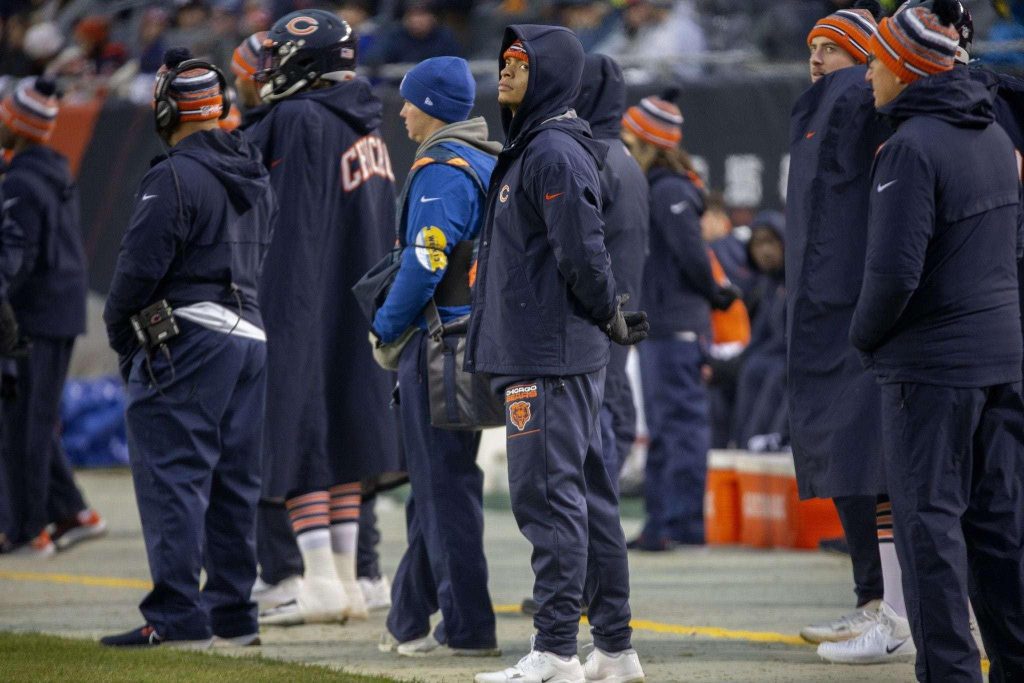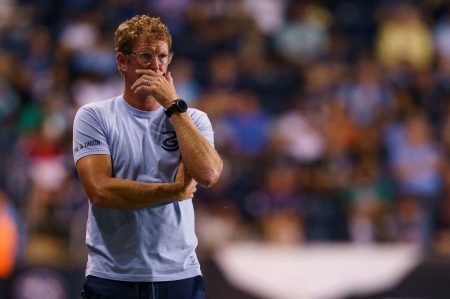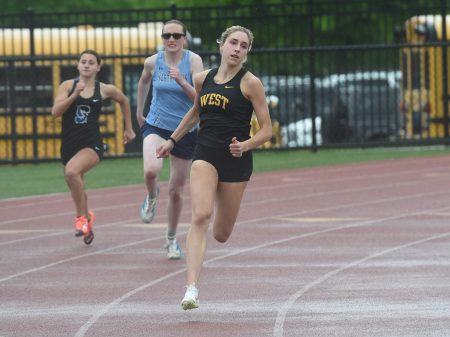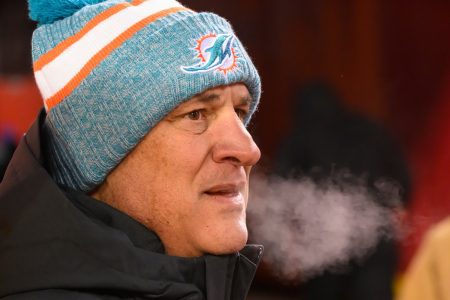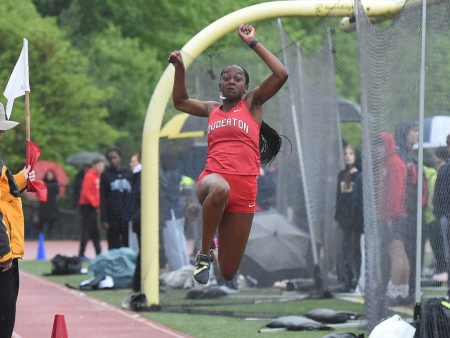Chicago Bears have a recently hired offensive coordinator. Tuesday marked the announcement of the hiring. Brad Biggs’ Bears mailbag is dominanted by questions about what the team is planning to do at quarterback after the hiring of Shane Waldron, a former Seattle Seahawks coordinator.
Shane Waldron's hiring has intensified the attention on the team's quarterback situation. Brad Biggs’ Bears mailbag is filled with questions about QB plans for the future.
Some people see Shane Waldron as a great hire due to his previous success with Geno Smith, while others are skeptical because of the middling performance of the Seahawks offense despite having talented players. The hire is being scrutinized for its potential impact. — @tn5280
The Bears' potential future under Waldron is a major point of interest. The Bears' outlook under Waldron is a significant question. More information is needed to fully analyze this. The quality of the roster will greatly influence Waldron's effectiveness.
According to a veteran pro scout, Waldron's system is likely to be similar to that of Sean McVay. The scout believes that Waldron's success will depend on the level of freedom he is given by the head coach. The scout also highlights the importance of an effective run game for Waldron's system, which the Bears already possess.
Waldron's offensive approach is anticipated to be different from Luke Getsy's. It might involve more pre-snap movement. The struggles of the Seahawks' running game in the past season were largely due to injuries on the offensive line.
The focus has been on Waldron's strategy and leadership capabilities. His ability to connect with and present information to players is seen as a crucial aspect of his role as the head coach of the offense.
Aside from tactics and play calling, Waldron's leadership and communication with players are essential. There is still much to learn about Waldron and decisions to be made regarding the roster.
There is a suggestion to consider the possibility of trading down from the No. 1 pick and building the team around Justin Fields. This would give Fields more time to prove himself, and provide the opportunity to acquire a new quarterback in the future if needed. — Jordan M., Fishers, Ind.
It might be unwise to dismiss any possibility at this early stage, but I don’t think the chances of your scenario happening are very high. The Bears have the No. 1 pick for the second year in a row, and they've had unstable quarterback play for over two years for various reasons. It's unpredictable how much draft assets Poles would have in the future if he decides to trade down.
When the Bears traded the No. 1 pick last year, it was the 13th time the top pick had been traded since 1967. Only two of those previous deals involved a future first-round pick.
- In 2016, the St. Louis Rams traded up to No. 1 with the Tennessee Titans to select quarterback Jared Goff. The Titans ended up with the fifth pick in 2017 from the Rams and used it on wide receiver Corey Davis.
- In 1990, the Indianapolis Colts traded up to No. 1 with the Atlanta Falcons to select quarterback Jeff George. The Falcons ended up with the 13th pick in 1991 from the Colts and used it on wide receiver Mike Pritchard.
If the Bears trade down from No. 1, there’s no way of knowing how valuable the pick(s) they would get back will be. The chances of them landing the No. 1 pick again wouldn’t be very good. For the sake of discussion, let’s say in a trade-down scenario, Poles nets the No. 4 pick in 2025. If there is one elite quarterback in that class, good luck being able to move up and get that player.
When quarterback is an issue and you’re in position to address the issue, I think you have to take action. I believe that is what the Bears will do.
After watching two weekends of playoff football, the passing plays and route designs are far more creative than what we saw from the Bears. Is it the offensive coordinator and play calling, the WR corps or just a plain talent disparity? — Ron M., DeKalb, Ill.
The route concepts you have seen in the playoffs are very similar to what the Bears did with Luke Getsy and really what every offense runs. There are only so many ways you can skin the cat, and the only real differences are in formations, pre-snap movement — and, of course, skill-position talent.
What you’ve seen throughout the playoffs is more talented pocket throwers than what the Bears have had for a long stretch, predating the Justin Fields era. C.J. Stroud, Patrick Mahomes, Jordan Love, Josh Allen, Brock Purdy, Jared Goff and Lamar Jackson are all highly skilled throwing from the pocket and on time. Most of the throws Jackson made Saturday, with the exception of the pass off the quarterback sweep, were from the pocket.
That’s what you haven’t seen with a high level of consistency from the Bears. That’s what looks different.
I’m confused by the argument that resetting the QB clock — saving $30 million for three years — is more cost effective than trading down and continuing with Justin Fields. That amount will get you maybe two or three impact players for the three years of savings, right? Meanwhile, a trade like the one last year will net about four additional first/second-round draft choices on four- or five-year rookie contracts. Even with having to pay Fields in Year 3, that strikes me as more cost effective and consistent with the “build-through-the-draft” mantra. Conceding that you’ll probably upgrade the QB position using the first pick, at what cost to other positions? Your thoughts? — Glen H.
I think that the Bears are not only considering drafting a new quarterback to replace Fields, but it's not the main factor in their decision. It could be a bonus, but only if they end up with the right quarterback.
The main point is that the Bears have had poor quarterback performance, and if you've watched the playoffs at all, you've noticed that the remaining teams have strong quarterback play. It's very difficult to consistently compete and succeed without having a good quarterback.
When the quarterback play is just okay, and the Bears' play has been below average, almost everything else needs to be outstanding to have a chance in the playoffs. The Bears have the opportunity with the first and ninth draft picks to choose a new quarterback and change their offensive direction. The financial impact of a rookie quarterback in his first year is just a small part of the whole picture.
The Bears need to consider whether adding more talent through a trade down would improve Fields' performance to a level that leads to sustained success. That's a possibility, and Fields' supporters would definitely encourage this idea. The Bears would also need to make successful picks with those additional selections.
There are so many ways to examine this scenario. I keep coming back to the fact that Fields has been the starter for three years and hasn't been consistently good, and now the Bears have the opportunity to pick first in a year that seems great for needing a quarterback. It's really not complicated.
I'm sure many wonder if Tyson Bagent could be the future quarterback. What about keeping Justin Fields next year, trading down, and reevaluating after 2024? — Joe H., Palos Park
Bagent’s development as an undrafted rookie and the fact he beat out P.J. Walker for a roster spot and then went 2-2 as the starter was a terrific story. I think Bagent has the ability to stick in the league for many years. He's wired to succeed and the moment wasn't too big for him in spots where we've seen quarterbacks with a lot more seasoning fall on their faces.
Bagent needs more time, though, and I don't think what we saw screamed “future franchise quarterback.” The team won't put a ceiling on his development, but it would be beyond risky to bet on Bagent for the future and use that as a rationalization to keep Fields.
You mentioned that it will not be possible to retain Justin Fields while taking a quarterback with the first pick, and the reasoning you provided makes sense to me. What is the possibility of picking up Fields’ fifth-year option and building weapons around him, and draft J.J. McCarthy late first round or in the second round? This will give Fields enough time to prove himself while McCarthy develops. This will not disrupt locker-room dynamics, and McCarthy has shown great leadership, maturity and key plays to help win the national championship. — Karthik J., Peoria
It's possible the Bears could use the first pick on a quarterback and retain Fields. It's my opinion they won't choose that avenue. I don't think the Bears are inclined to exercise the fifth-year option for 2025 in Fields’ contract because he hasn't played well enough over three seasons for that to be a viable consideration.
There’s a pretty good possibility McCarthy might be chosen in the first half of the opening round. I would be surprised if he lasted until Round 2, but sometimes quarterbacks do drop in the draft. I don’t think the Bears would cause problems in the team if they choose a quarterback and transition from Fields. If the team selects a quarterback, the players would likely support him. Good teammates stand by their quarterback.
Considering Cole Kmet is under contract for the foreseeable future and Robert Tonyan and Marcedes Lewis had low usage this year, is there a chance the Bears could pick Brock Bowers if he falls to them? — Mike F., Chicago
Bowers is an intriguing prospect and a highly skilled tight end. The Bears would need to want to use a lot of two-tight-end formations if they invest in Bowers. It’s more probable that they would choose a wide receiver since they currently don't have a No. 2 opposite DJ Moore under contract and they likely want to create competition for Tyler Scott for the No. 3 role.
Why is a Justin Fields trade only worth a Round 2 pick when there are so many teams in need of a quarterback and he clearly has the potential to become something special? — @opinion4you
I don’t think anyone knows exactly what Fields would fetch in a trade. I’ve expressed my doubts about the Bears being able to receive a first-round pick in return. They could possibly get a second-rounder, or the best offer might be a third-round pick with additional conditions or perhaps a third-rounder that could improve to a second. Who knows?
The more teams that could be involved, the more negotiating power the Bears would hold. Fields’ value is constrained by his performance in 38 career starts and the fact that he’s only under contract for one more season with an option for 2025. His value would also be limited if teams believe the Bears are definitely going to pick a quarterback in the first round. That’s why I anticipate GM Ryan Poles to play the waiting game as he evaluates the numerous options.
I have heard many experts state that Justin Fields does not make quick decisions in the pocket, leading to sacks or failed chunk plays. I have heard that Caleb Williams steps up in the pocket and under pressure delivers positive plays without holding on to the ball too long. Of course, both can scramble when necessary. Can coaches compare what Williams does against lower college-level talent to what Fields does in the NFL? — Ed S., Auburn, Ala.
That’s an intriguing question. One downside of Williams, especially this past season, was that he also tended to hold the ball too long while awaiting a play to develop.
I don’t think the Bears are directly comparing Fields and Williams. They need to conduct a thorough review of Fields and ascertain his potential career trajectory heading into Year 4. Then they need to extensively evaluate the quarterbacks in this draft class — including Williams and all the others — and project those players’ minimum and maximum potential. After that, they can determine the best course of action, whether it involves keeping Fields, keeping Fields and drafting a quarterback, or drafting a quarterback and transitioning from Fields.
They are in a very advantageous position with the first and ninth picks and they have a lot of influence in the market. When assessing Williams (and all the quarterbacks), it's a guess to figure out how they would do in the NFL after playing against college defenses. It's also a guess when considering the players they had around them. Williams didn't have much around him this past season. USC had a weak offensive line and not much skill talent on the outside.
If the Bears and White Sox are both searching for new stadiums, what are the odds that they would end up sharing one? — Dave, San Diego
The Oakland Coliseum, when it was home to the Raiders of the NFL and Athletics of MLB, was the last multiuse stadium. Those days are gone and I don't see them coming back in the near future. Teams want stadiums that are made specifically for their sport. I'd say the chances of the Bears and Sox sharing the same building are zero.
()





